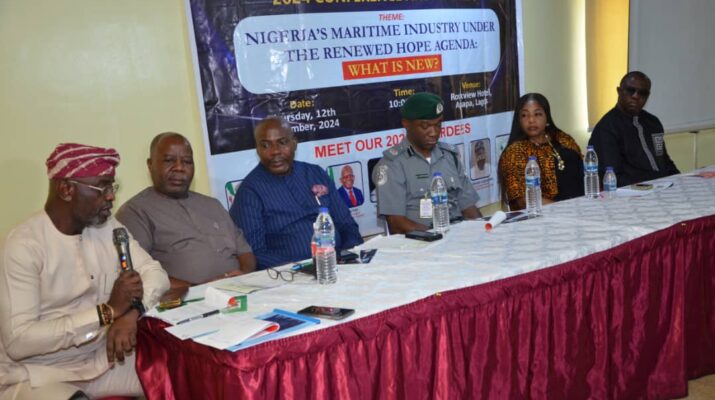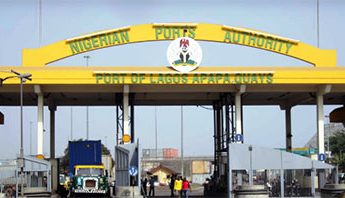At AMJON’s Conference, a maritime expert, Barrister Tony Iju Nwabunike advocates timely completion of the Trans-Sahara Gas Pipeline project to reap the full benefits of the Africa Continental Free Trade Area (AfCFTA), maintaining that creating smart borders, liberalizing visa regime and making Nigerian ports more export ready would benefit the country in no small measure
By ‘Fejiro Akpor
For Nigeria to effectively integrate into the Africa Continental Free Trade Area (AfCFTA) and benefit maximally from its opportunities, the Federal Government should do everything within available resources to complete the Trans-Sahara Gas Pipeline project on time.
A maritime expert, Chief Tony Iju Nwabunike, gave the charge in Lagos, while delivering a paper titled: How Nigeria as the Largest Economy Can Function Better in AfCFTA at the Association of Maritime Journalists of Nigeria’s (AMJON) 2024 Conference with the theme: Nigeria’s Maritime Industry Under the Renewed Hope Agenda: What Is New?
Specifically, he urged President Bola Ahmed Tinubu to strengthen the country’s diplomacy in this direction to achieve the timely completion of the project for Nigeria to reap the benefits, lamenting that the project has been slowed down by the July 2023 military coup in Niger.
Maintaining that this concern was applicable to Burkina Faso, Mali and Guinea whose democracies have suffered setbacks, he pointed out that trading within Nigeria’s continental confines will be of benefit to all 54 member countries of the AfTCA.
Addressing what he described as ‘geopolitical concerns, Nwabunike said: “Presently, Nigeria is not having the best of political relationship with Niger, which has the largest land space measuring 1.267million square kilometers bigger than Nigeria’s 923.7million square kilometers.
The Niger space is the largest in West Africa and very strategic in the economic interdependence of African countries. Nigeria’s improved relationship with France looks good but one can boldly say that as a growing economy, we need Niger, more than we need France.
“I say this as a freight forwarder with international exposure and as one who visited Niger as part of a delegation to convince them to patronise Nigeria’s first inland dry port in Kaduna. Our proximity to Mali and Algeria through Niger is a huge advantage to explore in reaching our North African brothers as over 10,000 trucks carrying trade goods to and from Nigeria travel along this route annually, all things being equal.
He explained that the Trans-Saharan Gas Pipeline project would connect Nigeria’s gas fields in Warri to Europe via Algeria, which must necessarily pass through Niger Republic, adding that it was planned to run from Warri in the Niger Delta region through Niger to Algeria and would connect to existing pipelines that supply gas to Europe through Algeria’s Mediterranean coast.
The pipeline, which will be 4,128 kilometers (2,565 miles) long, with 1,037 kilometers (644 miles) in Nigeria, 841 kilometers (523 miles) in Niger and 2,310 kilometers (1,440 miles) in Algeria, is expected to deliver about 30 billion cubic meters of gas yearly and is estimated to cost $13 billion.
On completion, the agreement for the pipeline, being expected to begin operations by 2030 was signed by Nigeria, Niger and Algeria to speed up the project after Russia’s invasion of Ukraine, which left Europe looking for more non-Russian gas.
On the need for smart borders, he noted that International Office of Migration’s (IOM) statistics showed that Nigeria has 86 official land borders and 14 seaport border control posts. The number of approved international border points in Nigeria is around 364, with about 261 in the North East and North West regions.
Revealing that there is no smart border in Nigeria currently, he said: “Our pace at modernisation of borders, which remain critical migration and trade gateways, has been very slow. Smart borders are border controls that use information and communication technologies (ICTs) to facilitate the movement of people, goods and means of transportation, while maintaining security.
“Smart borders are based on the principles of being automated, secure, tech driven with features of cargo tracking and biometric profiling of travelers. Such borders are planned to record and store activities for ease of access to replay, retrieve for analysis or analytics.
“No border in Nigeria aptly meets the requirements to be called a smart border and as a country envisaging good volume of trade, the Federal Government needs to up our game in this direction for the purpose of national security, economic protection and proper monitoring of human and cargo movements across the frontiers.
Nwabunike, who is a Patron of AMJON, insisted that with multiple entry points, Nigeria’s preparedness for a full implementation of AfCFTA agreement is important to determine the country’s suitability for seamless trade within the region and other parts of the continent.
On insecurity in the country, he also maintained that the country must strive to address the security challenges confronting the nation for any meaningful progress to be made, pointing out that the Nigerian government through the armed forces has been making efforts at fighting insecurity even in border areas but recent happenings show that the challenges are far from over.
He recalled that in November 2024, reports were rife in the media about the creation of a new terrorist group named Lakurawa operating in northern states bordering Niger Republic, noting: “The Lakurawa group, affiliated with terrorists in the Sahel, particularly from Mali and Niger, became a national security challenge after launching its first audacious attack on November 4.
“Found in Illela, Gudu, Tangaza, and Gada, among others, the group stays in borders with either the Niger Republic or other states and have reportedly established presence in Sokoto, Kebbi and Zamfara.
“This new group is said to operate around border-states and towns, which is a direct threat to trade and social stability in the affected areas where non-state actors have shown tendencies to unlawfully bear arms, impose taxation and disrupt lawful governance system.
“Although we read that the government is taking action against the group with collaboration of troops from Niger and Chad, we expect a permanent solution. Trans-border traders need their confidence rebuilt by the Nigerian state whose duty is to ensure the group and other illegal armed groups along our border corridors cease to exist.”
He also canvassed a liberalised visa regime among the 54 signatories of the AfCFTA, saying: “While I commend President Bola Tinubu for his recent move to South Africa to negotiate a soft visa issuance regime for Nigerian businessmen and tourists, I want to urge that same strategy be applied to other African countries outside the ECOWAS region.
“This, when achieved, can shorten travel preparation time and cost, creating room for Nigerian traders to tap into the wider African market. This move can set the tone for the African Union to ease connectivity.”
Nwabunike, who equally made a strong case for making Nigerian Ports more export ready, stated that beyond rhetoric, the Nigerian Ports Authority (NPA) should dedicate more space for exports and work towards reviving moribund legacy ports like Burutu, Sapele (presently being used by the Nigerian Navy for Engineering), Koko Port and Calabar Port.
He argued that the nation’s maritime infrastructure remain relevant for today’s Nigeria and could serve the larger interests of Nigerians and Africans using the maritime space to trade under the AfCFTA regime.
“Being big and having the opportunity to take advantage of our size and endowments are a different game from stepping forward to maximise it when the opportunity comes. We have the potential to become the biggest beneficiary country in AfCFTA if we get electricity right for industrialisation with safer fields for our farmers and trans-border traders and the time to start acting on it is Now!!!” he concluded.




